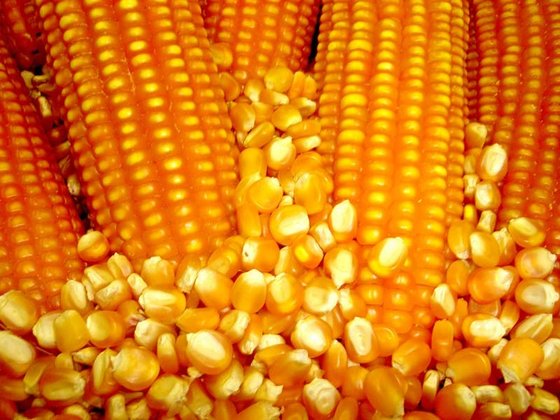The release of 50,000 metric tonnes of maize grains from the reserve as ordered by the Central Bank of Nigeria (CBN) to plug the production shortfall has failed to crash the price of the commodity.
Findings on Tuesday showed that the price of one metric tonne of maize has increased by 15 percent between December last year and April this year.
Checks showed that maize sells at an average price of N230,000 per metric tonne as of April compared to N200,000 per metric tonne in December.
The CBN had in February ordered the release of 50,000 metric tonnes of maize into the Nigerian market as part of its pledge to reduce the price of the commodity.
It was reported that the release was done through the Anchor Borrowers’ Programme (ABP) to major poultry feed producers and poultry producers in the country.
The grains released from the reserves formed the first tranche of a total of 300,000 metric tonnes that the apex bank promised to release into the Nigerian Maize Market to reduce the activities of intermediaries (middlemen) in the Nigerian Maize market and support local production.
This intervention became necessary following the scarcity and steady increase in the price of the commodity in the market since last year, which led to high cost of poultry feed, financial distress to farmers and loss farmers’ investment.
Contrary the speculations that the release of maize grains from the reserve would crash the price of the commodity to N180,000, the President of All Farmers Association of Nigeria (AFAN), Kabir Ibrahim, argued that the volume was too small to have a significant impact on the market price of the commodity.
READ ALSO: Farmers Predict 25% Crash In Maize Prices as CBN Plans Release Of 300,000 Metric Tonnes
Speaking with BizWatch Nigeria, the Kabir Muhammadu, said though the grains had been allocated to major poultry feed producers, who are expected to sell at N160,000 per metric tonne but that the market price had not changed.
He said, “The CBN promised to release 300,000 metric tonnes but they have not released the 300,000 metric tonnes yet. They have made allocation. It cannot happen overnight; probably when they flood the market, the price will crash. Releasing stored grains and selling at a lower price in the market will reduce the local price but the quantity is not enough.
“The maize association involved in the anchor borrowers is paying back in kind; probably when they release large quantity of maize, it will probably bring down the price.”
Beneficiaries Have Not Received Maize From Reserves – Poultry Association
Also, the President, Poultry Association of Nigeria (PAN), Ezekiel Ibrahim, claimed the release of 50,000 maize grains from the reserve was a sham as some of the beneficiaries had not received the grains allocated to them.
According to him, some of the beneficiaries have not been given the specific location of grain reserve where they will pick up the commodity.
The Major beneficiaries of the February release, according to CBN, include Premier Flour Mills, Crown – Olam, Grand Cereals, Animal Care, Amobyn and Hybrid Feeds. Others include Zartech, Wacot, Sayeed Farms, Pandagri Novum and Premium Farms as well as the South West, South-South, North West and North Central chapters of the Poultry Association of Nigeria (PAN).
Ibrahim queried the availability of maize grains in the reserve, claiming that farmers who received funds and farm input from the CBN to enable them farm and supply grains for the reserve had failed to go to the farm.
He said, “The ones the maize grains were allocated to, have they collected the maize? Where is the reserve located? You allocated maize but didn’t tell them where to lift it up. We want to know where the reserves are? If they have not collected, what is the reason? When you expect something out of nothing, how is that possible?”
The PAN president described the Anchor Borrowers’ Scheme as a scam, saying that beneficiaries of the programme failed to fulfill their part of the agreement by cultivating and supplying the government reserves with their harvested produce.
READ ALSO: Transaction Value Of Cattle In Lagos Alone Is N328bn
Giving an analogy of the situation, he said,” Presumably, you are given money to go and farm and you are expected to sell the maize at N10,000 per metric tonnes and you didn’t go to farm and assumed that by harvest, maize will be N7,000 or N8,000.
“If you go and buy, you know you are still making N3,000. But you assumed you are the only one, not knowing that 50 per cent of farmers that collected the money didn’t go to farm. Then by November and December, you went to market to supply the CBN and found out that the price of maize is N15,000 because there are a lot of money chasing few goods.
“Can you buy and lose N5,000? And the CBN has already calculated that farmers are going to supply maize, not money. The CNN is supposed to have a reserve of 300,000 metric tonnes. The bank calls to ask if maize has been delivered to ware houses in Katsina or Adamawa and was told that maize has not been delivered.”
According to him, the excuse given by farmers that their farms was destroyed during #EndSARS protest and by flood was not tenable.

CBN supported 200,000 maize farmers in 2020
Over 200,000 farmers under the aegis of Maize Growers Processors and Marketers Association of Nigeria (MAGPAMAN) received support to produce maize grains from the apex bank in 2020.
The national president, MAGPAMAN, had confirmed this in a statement saying over 200,000 farmers are aiming to produce more than 25 million metric tonnes of maize in the 2020/2021 planting season.
“As part of the Bank’s financing framework, the CBN has facilitated the funding of maize farmers and processors through the Anchor Borrowers’ Programme (ABP) Commodity Association, Private/Prime Anchors, State Governments, Maize Aggregation Scheme (MAS), and the Commercial Agricultural Credit Scheme (CACS), ” the statement read.
Also, the National President of Maize Association of Nigeria (MAAN), Bello Abubakar, confirmed the release of credit to its members by the apex bank.
According to him, the credit is disbursed to members along the maize value chain, located in different states of the country.
CBN Suspends Anchor Borowers’ Scheme
Meanwhile, the CBN has suspended the Anchor Borrowers’ Programme and other loans to the Nigeria Incentive-Based Risk Sharing System for Agricultural Lending (NIRSAL) due to widespread allegations of corruption.
The Chief Executive of the scheme, Aliyu Abdulhameed, have been accused of endemic corruption in recent months.
The CBN’s suspension of further loans to NIRSAL under Abdulhameed was contained in a March 10 correspondence that referenced a February 24 meeting.
The apex bank said the decision would only be rescinded after all outstanding loans out of NIRSAL have been resolved.
The financial regulator also directed NIRSAL to submit monthly reports on its activities, indicating the commencement of an audit into the activities of the credit risk managers.












